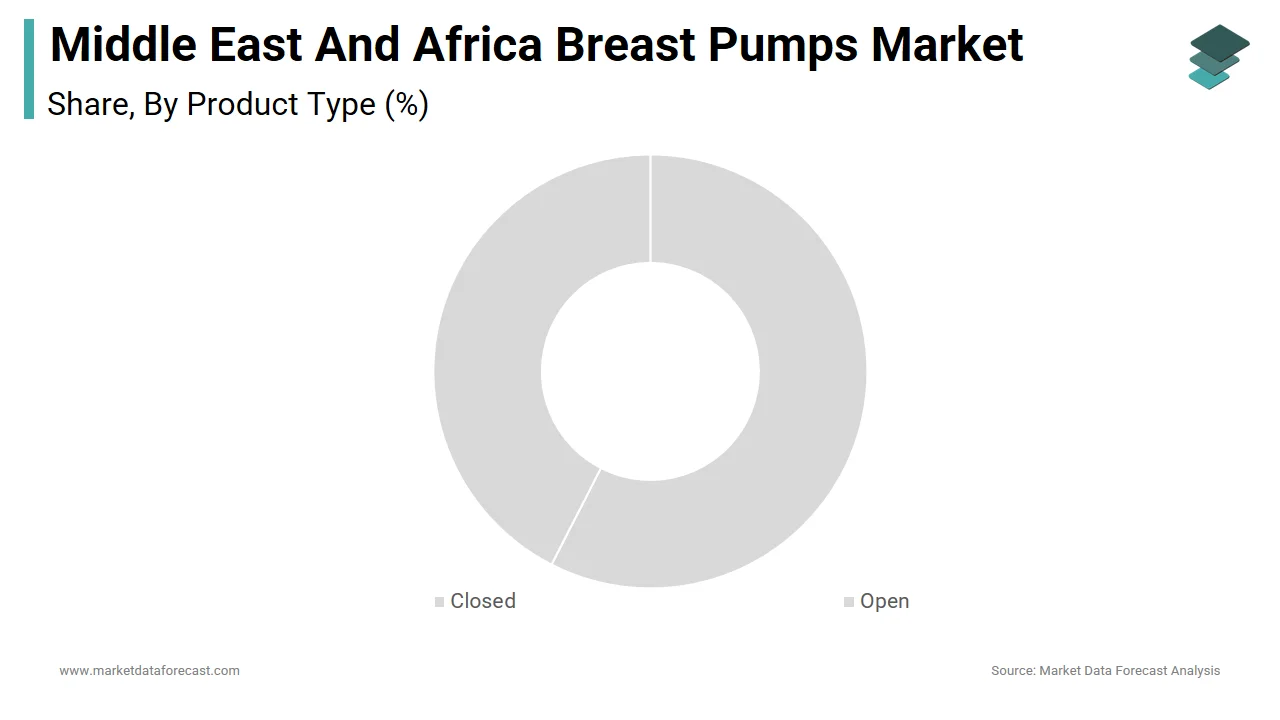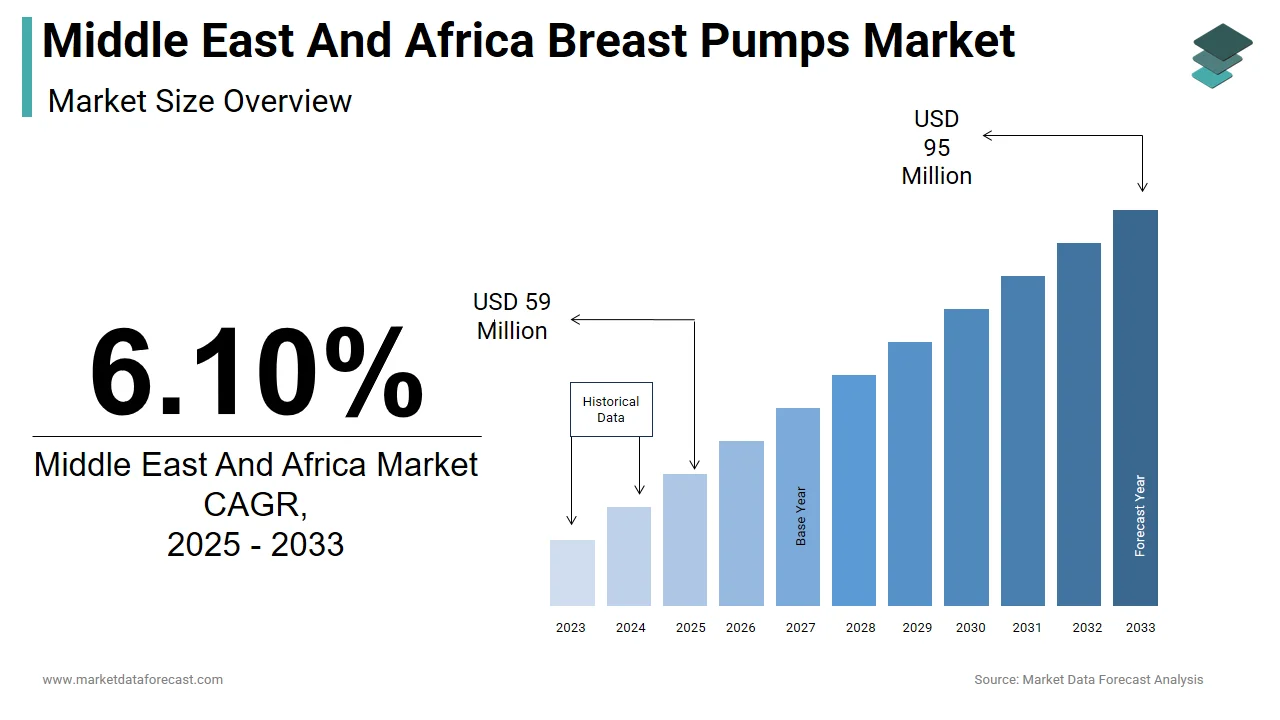Middle East And Africa Breast Pumps Market Size, Share, Trends & Growth Forecast Report By Product Type, By Application, By Technology & and Country (KSA, UAE, Israel, Rest of GCC, South Africa, Ethiopia, Kenya, Egypt, Sudan, Rest of MEA) – Industry Analysis From 2025 to 2033.
Middle East And Africa Breast Pumps Market Size
The size of the Middle East and Africa breast pumps market was worth USD 56 million in 2024. The market is anticipated to grow at a CAGR of 6.10% from 2025 to 2033 and be worth USD 95 million by 2033 from USD 59 million in 2025.
MARKET DRIVERS
Rising Working Women Population and Government Support Fueling Breast Pump Adoption in MEA
Growing investments in developing new devices in the medical sector and promoting quality services are significant factors driving the MEA breast pumps market. The rise in the number of working-class women is another key attribute fuelling the market's growth rate. These devices are highly efficient and are very convenient for users. In addition, rising incidences of breastfeeding difficulties in most women and growing support from the government and organizations to create awareness over breast pumps are further propelling the market's growth rate.
MARKET RESTRAINTS
Government Policy Shifts, High Prices, and Lack of Skilled Labor Hindering Market Growth
However, changes in the economic strategies by the government in various countries are slowly hampering the demand of the market. Furthermore, rising prices of the final products due to fluctuations in the availability of raw materials are one more factor restricting the market's need. In addition, the challenge for the market players is stringent rules and regulations by the government in approving new products and decreasing the number of skilled people to manufacture the latest designs.
MARKET OPPORTUNITIES
Tech Innovation, E-commerce Growth, and Urban Lifestyle Trends to Accelerate Market Expansion
Focus on developing innovative devices in the medical sector with the latest technologies is solely to create growth opportunities for the Middle East and Africa market. In addition, increasing disposable income in urban areas, rise in the number of online stores where the devices are available easily, growing demand for infection-free systems, and the trend towards a healthy lifestyle and rising awareness towards breast pumps are further predicted to generate growth possibilities to the MEA breast pumps market during the forecast period.
SEGMENTAL ANALYSIS
By Product Type Insights

REGIONAL ANALYSIS
Geographically, the MEA breast pumps market is estimated to be accounting for a moderate share during the forecast period and is majorly driven by rising investments in creating innovative medical equipment, promoting high-quality services, and growth is the increase in the number of working-class women.
The main purpose of focusing on producing revolutionary medical gadgets using cutting-edge technologies is to expand the Middle East and Africa market. In addition, increased disposable income in urban areas, an increase in the number of online stores where devices can be purchased quickly, rising demand for infection-free systems, and the trend toward a healthy lifestyle and increased awareness of breast pumps are all expected to boost the MEA breast pumps market during the forecast period.
Increased awareness of the benefits of giving breast milk boosts operations at the breast or human milk banks throughout the Middle East and Africa, increasing demand for breast pumps in the region. In upper and middle-income countries around the world, there are over 600 human milk banks.
The breast pump market in the Middle East and Africa are divided into two categories: distribution channel, consumer retail, and internet distribution. The consumer retail segment had a bigger market share. However, from 2023 to 2028, the online distribution segment is predicted to grow at a faster rate.
KEY MARKET PLAYERS
A few noteworthy companies operating in the MEA Breast pumps market profiled in this report are Pigeon Group (Pigeon Corporation), Koninklijke Philips N.V., Ameda, Inc., Ardo Medical Ag, Evenflo Feeding, Inc. Other players in the market are Mayborn Group Limited (Shanghai Jahwa Co. Ltd), Spectra Baby USA, Albert Manufacturing USA (Albert Group), Hygeia Health, and others.
MARKET SEGMENTATION
This Middle East and Africa breast pumps market research report is segmented and sub-segmented into the following categories.
By Product Type
- Closed
- Open
By Application
- Personal Use Pumps
- Healthcare/hospital Grade Pumps
By Technology
- Battery Powered
- Manual
- Electric
By Country
- KSA
- UAE
- Israel
- Rest of the GCC countries
- South Africa
- Ethiopia
- Kenya
- Egypt
- Sudan
- rest of MEA
Related Reports
Access the study in MULTIPLE FORMATS
Purchase options starting from
$ 1600
Didn’t find what you’re looking for?
TALK TO OUR ANALYST TEAM
Need something within your budget?
NO WORRIES! WE GOT YOU COVERED!
Call us on: +1 888 702 9696 (U.S Toll Free)
Write to us: sales@marketdataforecast.com

